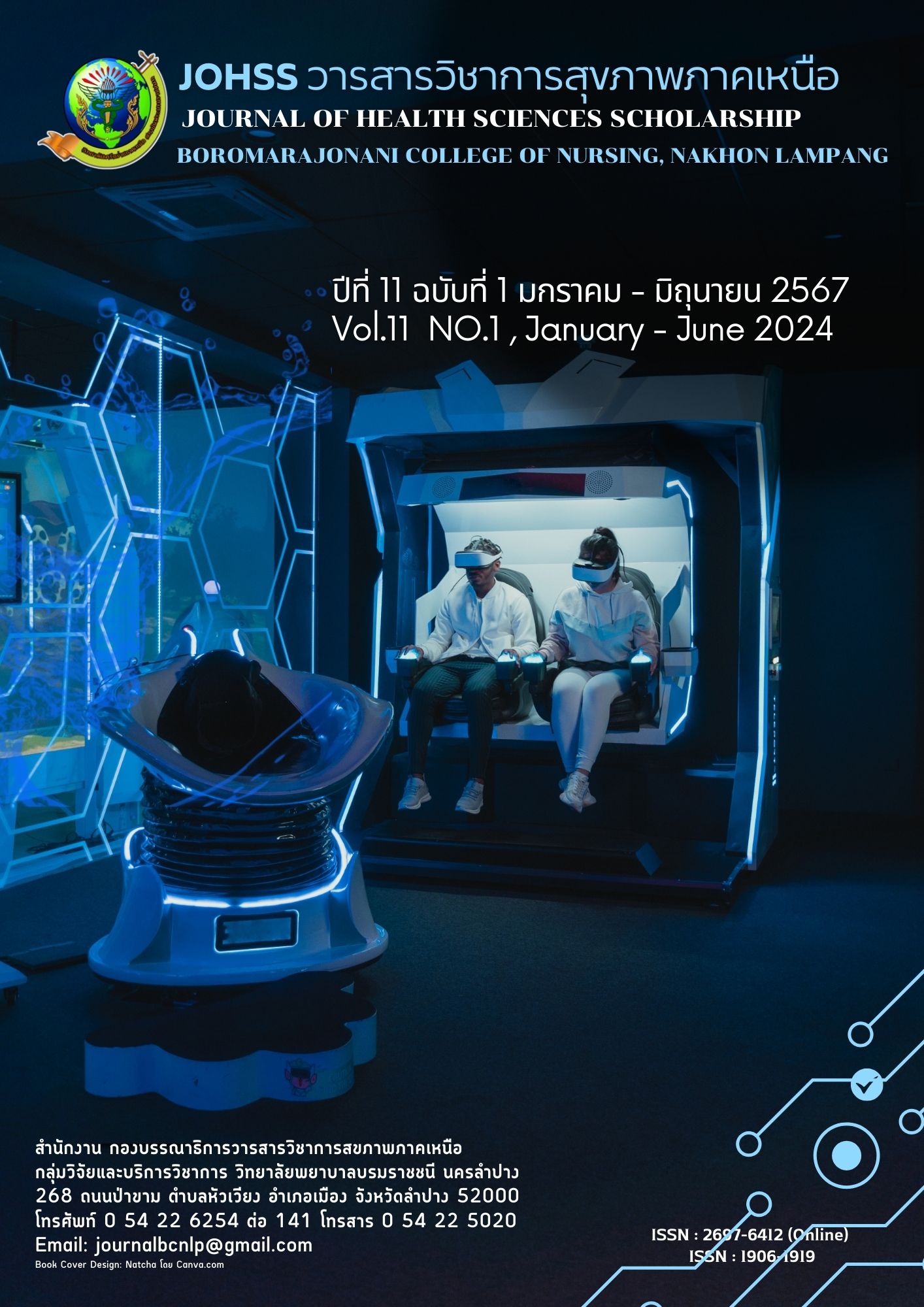ผลของโปรแกรมการส่งเสริมการรับรู้อิสระแห่งตนต่อพฤติกรรมการจัดการตนเอง และระดับฮีโมโกลบินเอวันซีของผู้สูงอายุโรคเบาหวานใน อำเภอห้างฉัตร จังหวัดลำปาง
บทคัดย่อ
การวิจัยเชิงทดลองแบบสุ่มชนิดมีกลุ่มควบคุมเพื่อเปรียบเทียบระหว่างผลของโปรแกรมส่งเสริมความเป็นอิสระแห่งตนของผู้สูงอายุโรคเบาหวานต่อพฤติกรรมการจัดการตนเอง และระดับฮีโมโกลบินเอวันซี กลุ่มตัวอย่างคือ ผู้สูงอายุโรคเบาหวานโรงพยาบาลห้างฉัตร จำนวน 60 ราย แบ่งเป็นกลุ่มควบคุมและกลุ่มทดลอง กลุ่มละ 30 ราย ทำการคัดเลือกกลุ่มตัวอย่างโดยการสุ่มใช้ขนาดของบล็อคเท่ากับ 6 ทำให้ได้จำนวน 10 บล๊อค และทำการสุ่มตามบล๊อคไปเรื่อยๆ โดยกลุ่มควบคุมได้รับการพยาบาลตามมาตรฐานของโรงพยาบาล กลุ่มทดลองได้รับโปรแกรมการส่งเสริมความเป็นอิสระแห่งตน ทำการเก็บรวบรวมข้อมูลโดยใช้แบบประเมินพฤติกรรมการจัดการตนเองในผู้สูงอายุโรคเบาหวาน มีค่าความเชื่อมั่นสัมประสิทธิ์แอลฟาของครอนบาค เท่ากับ 0.85 และวิเคราะห์ข้อมูลโดยใช้สถิติไคสแควร์ และสถิติพรรณนา ผลการวิจัยพบว่าคะแนนเฉลี่ยพฤติกรรมการจัดการตนเองระหว่างกลุ่มทดลองและกลุ่มควบคุมแตกต่างกันอย่างมีนัยสำคัญทางสถิติ (p < .05) และกลุ่มทดลองมีระดับฮีโมโกลบิน เอวันซีหลังจากเข้าร่วมโปรแกรมดีกว่าก่อนเข้าร่วมโปรแกรม และดีกว่ากลุ่มควบคุมอย่างมีนัยสำคัญทางสถิติ (p < .05) ดังนั้นการสนับสนุนความเป็นอิสระแห่งตนส่งผลให้ผู้สูงอายุโรคเบาหวานมีพฤติกรรมการจัดการตนเองที่ดีและควบคุมระดับฮีโมโกลบินเอวันซีได้ดี โดยผ่านกิจกรรมการให้ความรู้ การฝึกทักษะร่วมกับให้มีส่วนร่วมในการตัดสินใจการเลือกวิธีการรับประทาน และควบคุมอาหารตามความต้องการของตนเอง รวมถึงเลือกชนิดการออกกำลังกายตามความชอบและความสามารถของตนเอง ซึ่งสามารถนำโปรแกรมไปประยุกต์ใช้กับหน่วยบริการสุขภาพที่มีบริบทใกล้เคียงกันได้
เอกสารอ้างอิง
Bhumirajanakarindra Kidney Institute Hospital. (2021). Diabetes Care in Primary Heath Care. Retrieved 4 November, 2023, from: http://www.kpo.go.th/webkpo/download/DM.pdf. (in Thai)
Boonprasit, S., Somanusorn, S, & Sumngern, C. (2016). Factors Related to Self-Management for Controlling Plasma Glucose in Uncontrolled Diabetes Elderly. Journal of Boromarajonani College of Nursing Bangkok, 32(1), 44-56. Retrieved 10 August, 2022, from: https://nurse.buu.ac.th/rsh/file/journal/0000000657.pdf. (in Thai)
Deci, E. L., Ryan, R. M., Gagne, M., Leone, D. R., Usunov, J., & Kornazheva, B. P. (2001). Need satisfaction, motivation, and well-being in the work organizations of a former Eastern Bloc country: A cross-cultural study of self-determination. Personality and Social Psychology Bulletin, 27(8), 930-942. doi:10.1177/0146167201278002
Department of diseases control. (2023). Annual report 2023, Retrieved 4 November, 2023, from: http://www.thaincd.com/2016/media-detail.php?id=13800&tid=30&tid=&gid=1-015-005. (in Thai)
Department of diseases control. (2021). World Diabetes Day2021. Retrieved 10 August, 2022, from: https://ddc.moph.go.th/brc/news.php?news=38403&deptcode=brc&news_views=2606. (in Thai)
Hang Chat Hospital. (2022). Annual report 2018-2022. Hang Chat Hospital. (in Thai)
Kaewnete, T. (2023). The Effectiveness of Health Promotion Programs among Patients with Uncontrolled Diabetes Mellitus. Science and Technology Journal of Sisaket Rajabhat University, 3(1), 54-67. Retrieved 4 November, 2023, from: https://li01.tci-thaijo.org/index.php/STJS/article/view/259412/176457. (in Thai)
Lee, J. E., Han, H. R., Song, H., Kim, J., Kim, K. B., Ryu, J. P., & Kim, M. T. (2011). Correlates of self-care behaviors for managing hypertension among Korean Americans: A questionnaire survey. International Journal of Nursing Studies, 47(4), 411-417. Retrieved 10 August, 2022, from: https://pure.johnshopkins.edu/en/publications/correlates-of-self-carebehaviors-for-managing-hypertension-among-5
Lorig, K. R. & Holman, H. (2003). Self-management education: History, definition, outcomes and mechanisms. Annals of Behavioral Medicine, 26, 1-7. doi:10.1207/S15324796ABM2601_01.
McWilliam, C. L., Brown, J. B., Carmichael, J. L., & Lehman, J. M. (1994). A new perspective on threatened autonomy in elderly persons: The disempowering process. Social Science and Medicine, 38(2), 327-338. doi:10.1016/0277-9536(94)90402-2.
Munsrakeat, K., Rawiworrakul, T., & Lagampan, S. (2019). Effects of Self-Management Program for Glycemic Control Among Insulin Depen-dent Type 2 Diabetes Patients. The Journal of Baromarajonani College of Nursing, Nakhon Ratchasima, 25(2), 87-103. Retrieved 4 November, 2023, from: http://journal.knc.ac.th/pdf/25-2-2562-6.pdf. (in Thai)
Raaijmakers, L. G., Martens, M. K., Hesselink, A. E., & Kremers, S. P. J. (2014). Mastery and perceived autonomy support are correlates of Dutch diabetes patients’ self-management and quality of life. Patient Education and Counseling, 97(1), 75-81. doi:10.1016/j.pec.2014.06.016. Epub 2014 Jul 5.
The Royal College of Physicians of Thailand. (2023). Clinical Practice Guideline for Diabetes 2023. Retrieved 4 November, 2023, from: https://www.dmthai.org/new/index.php/sara-khwam-ru/bukhlakr-thangkar-phaethy/cpg/naewthang-wech-ptibati-sahrab-rokh-bea-hwan-2567. (in Thai)
Ryan, R. M., Williams, G. C., Patrick, M. H., & Deci, E. L. (2009). Self-determination theory and
physical activity: The dynamic of motivation in development and wellness. Hellenic Journal of Psychology, 6, 107-124. Retrieved 10 August, 2022, from: http://www.pseve.org/journal/Articlesview.asp?key=107
Sarakshetrin, A., Tongpeth, J., Daungchan, C., & Rungnoei, N. (2023). The Effectiveness of Health Promotion and Self-Management Support Program on Self-Management Behavior and Clinical Outcomes among Uncontrolled Type 2 Diabetes and Hypertension Patients. Journal of Health Science, 32(2), 299-311. Retrieved 4 November, 2023, from: https://nurse.buu.ac.th/rsh/file/journal/0000000657.pdf. (in Thai)
Srisomthrong, K., Chintanawat, R., & Sucamvang, K. (2017). Self-Management Supporting Programme and Its Impact on Foot-Care Behaviour of Elderly Type-2 Diabetes Patients. Thai Journal of Nursing Council, 32(3), 120-134. Retrieved 4 November, 2023, from: https://he02.tci-thaijo.org/index.php/TJONC/article/view/102289. (in Thai)
Williams, G. C., Freedman, Z. R., Deci, E. L. (1998). Supporting autonomy to motivate patients with diabetes for glucose control. Diabetes Care, 21, 1644-1651. doi:10.2337/diacare.21.10.1644.
Williams, G. C., McGregor, H. A., Zeldman, A., Freedman, Z. R., & Deci, E. L. (2004). Testing a self-determination theory process model for promoting glycemic control through diabetes self-management. Health Psychology, 23, 58-66. doi:10.2337/diacare.21.10.1644.
Yun, Liu, Shen, Jiang, Fan, Liu & Chang, (2019). Can autonomy support have an effect on type 2 diabetes glycemic control? Results of a cluster randomized controlled trial. British Medical Journal Open Diabetes Res Care, 8(1): e001018. doi:10.1136/bmjdrc-2019-001018. PMID: 32299898; PMCID: PMC7199146.
Zeldman, A., Ryan, R. M., & Fiscella, K. (2004). Motivation, autonomy support, and entity beliefs: Their role in methadone maintenance treatment. Journal of Social and Clinical Psychology, 23(5), 675–696. https://doi.org/10.1521/jscp.23.5.675.50744
Zoffmann, V., & Lauritzen, T. (2006). Guided self-determination improves life skills with type 1 diabetes and HbA1C in randomized controlled trial. Patient Education and Counseling, 64(1-3), 78-86. doi: 10.1016/j.pec.2005.11.017. Epub 2006 May 23.
ดาวน์โหลด
เผยแพร่แล้ว
ฉบับ
ประเภทบทความ
สัญญาอนุญาต
ลิขสิทธิ์ (c) 2024 วิทยาลัยพยาบาลบรมราชชนนี นครลำปาง

อนุญาตภายใต้เงื่อนไข Creative Commons Attribution-NonCommercial-NoDerivatives 4.0 International License.
บทความ ข้อมูล เนื้อหา รูปภาพ ฯลฯ ที่ได้รับการตีพิมพ์ในวารสารวารสารวิชาการสุขภาพภาคเหนือ ถือเป็นลิขสิทธิ์ของวารสารวารสารวิชาการสุขภาพภาคเหนือ หากบุคคลหรือหน่วยงานใดต้องการนำทั้งหมดหรือส่วนหนึ่งส่วนใดไปเผยแพร่ต่อหรือเพื่อกระทำการใดๆ จะต้องได้รับอนุญาตเป็นลายลักอักษรจากวารสารวารสารวิชาการสุขภาพภาคเหนือก่อนเท่านั้น
เนื้อหาและข้อมูลในบทความที่ลงตีพิมพ์ในวารสารวิชาการสุขภาพภาคเหนือถือเป็นข้อคิดเห็นและความรับผิดชอบของผู้เขียนบทความโดยตรงซึ่งกองบรรณาธิการวารสาร ไม่จำเป็นต้องเห็นด้วย หรือร่วมรับผิดชอบใดๆ
อนึ่ง ข้อความและข้อคิดเห็นต่างๆ เป็นของผู้เขียนบทความนั้นๆ ไม่ถือเป็นความเห็นของวารสารฯ และวารสารฯ ไม่จำเป็นต้องเห็นด้วยกับข้อความและข้อคิดเห็นใดๆ ของผู้เขียน วารสารฯ ขอสงวนสิทธิ์ในการพิจารณาตีพิมพ์ตามความเหมาะสม รวมทั้งการตรวจทานแก้ไขหรือขัดเกลาภาษาให้ถูกต้องตามเกณฑ์ที่กำหนด



